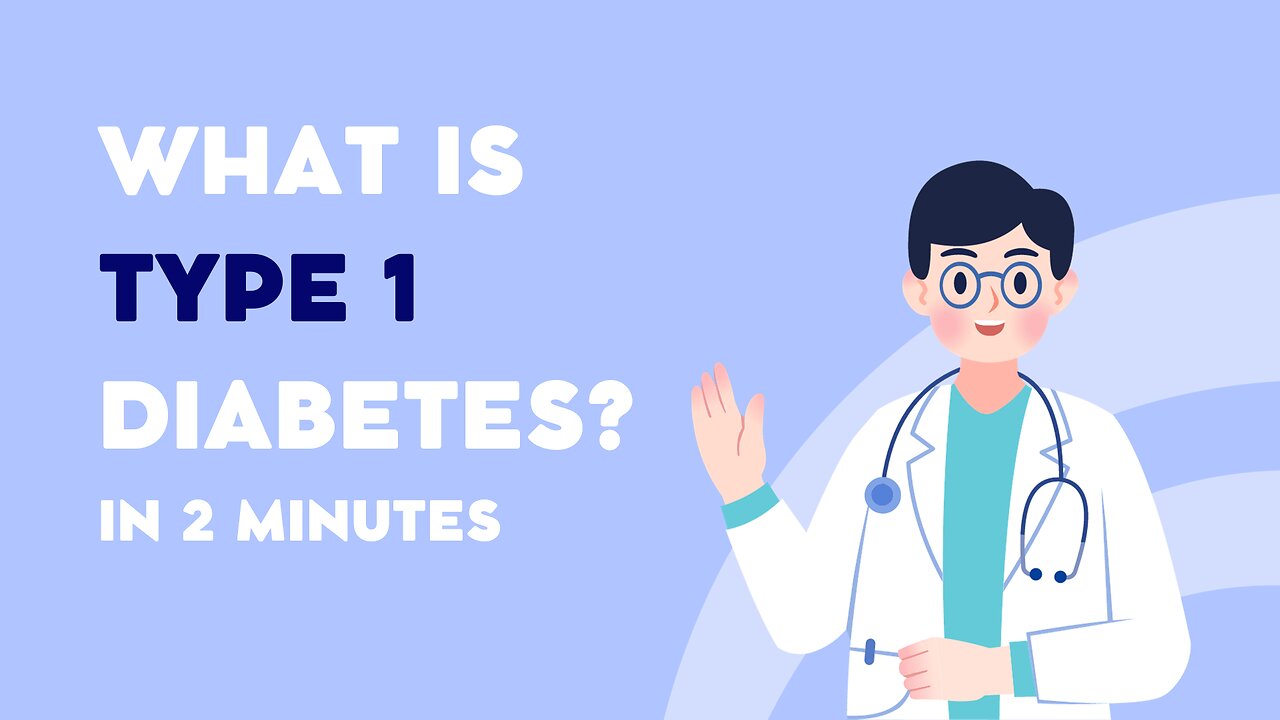Premium Only Content

What is Type 1 Diabetes in 2 Minutes
Type 1 diabetes, often referred to as "juvenile diabetes" or "insulin-dependent diabetes," is a chronic autoimmune condition in which the immune system mistakenly attacks and destroys the insulin-producing beta cells in the pancreas. As a result, the pancreas is unable to produce insulin, a hormone that regulates blood sugar (glucose) levels in the body.
Here are some key characteristics and features of Type 1 diabetes:
Autoimmune Disorder: Type 1 diabetes is an autoimmune disease, which means the body's own immune system attacks and destroys healthy cells. In this case, the immune system targets and damages the beta cells in the pancreas that produce insulin.
Insulin Dependency: People with Type 1 diabetes require lifelong insulin therapy because their bodies do not produce any insulin. Without insulin, the body cannot properly regulate blood sugar levels.
Onset in Youth: While Type 1 diabetes can develop at any age, it often starts in childhood or adolescence. However, it can also occur in adults.
Symptoms: The symptoms of Type 1 diabetes include excessive thirst (polydipsia), frequent urination (polyuria), unexplained weight loss, extreme hunger (polyphagia), fatigue, and blurred vision. These symptoms can develop relatively quickly.
Blood Sugar Management: Managing blood sugar levels in Type 1 diabetes requires a combination of insulin therapy, regular blood glucose monitoring, and careful attention to diet and exercise. The goal is to keep blood sugar levels within a target range to prevent both short-term and long-term complications.
Complications: If not properly managed, Type 1 diabetes can lead to various health complications, including heart disease, kidney disease, nerve damage (neuropathy), eye problems (retinopathy), and circulation issues. However, with good blood sugar control and proper medical care, the risk of complications can be reduced.
Treatment: Treatment for Type 1 diabetes primarily involves insulin replacement therapy. Insulin can be administered through injections or an insulin pump. The specific insulin regimen and dosage may vary from person to person based on their individual needs.
Lifestyle Management: People with Type 1 diabetes also need to pay close attention to their diet, exercise regularly, and monitor their blood sugar levels regularly. These lifestyle factors play a crucial role in managing blood sugar levels.
Type 1 diabetes is a lifelong condition that requires continuous self-management and medical care. Research into diabetes treatment and management is ongoing, with ongoing efforts to improve insulin delivery methods and find potential cures or therapies to prevent the development of Type 1 diabetes.
-
 LIVE
LIVE
The Jimmy Dore Show
2 hours agoCharlie Kirk Shooter CAUGHT! Netanyahu Demands: “NO PALESTINIAN STATE!” w/ Misty Winston
6,362 watching -
 LIVE
LIVE
Kim Iversen
1 hour agoBlaming Nick Fuentes For Charlie Kirk's Death In 3...2...1...
3,389 watching -
 1:08:42
1:08:42
Roseanne Barr
4 hours agoFor Charlie…| The Roseanne Barr Podcast #115
113K63 -
 LIVE
LIVE
TundraTactical
1 hour agoWhats The Deal With New Guns In 2025
102 watching -
 LIVE
LIVE
Wayne Allyn Root | WAR Zone
4 hours agoWAR Zone LIVE | 12 SEPTEMBER 2025
67 watching -
 1:05:02
1:05:02
vivafrei
4 hours agoCharlie Kirk Assassin ARRESTED! Universal Ostrich Farms UPDATE! And More!
98.5K135 -
 1:44:36
1:44:36
Megyn Kelly
1 day agoRemembering Charlie Kirk, with Tucker Carlson, Donald Trump Jr., and Benny Johnson
48.1K106 -
 9:40
9:40
Lara Logan
2 hours agoHonoring Charlie Kirk - Going Rogue with Lara Logan - LIVE
28.3K31 -
 3:03:45
3:03:45
The Charlie Kirk Show
6 hours agoCharlie Kirk: A Life of Faith, A Legacy That Endures
451K396 -
 3:58:08
3:58:08
The Rubin Report
6 hours agoCharlie Kirk’s Best Moments on The Rubin Report
68.5K26